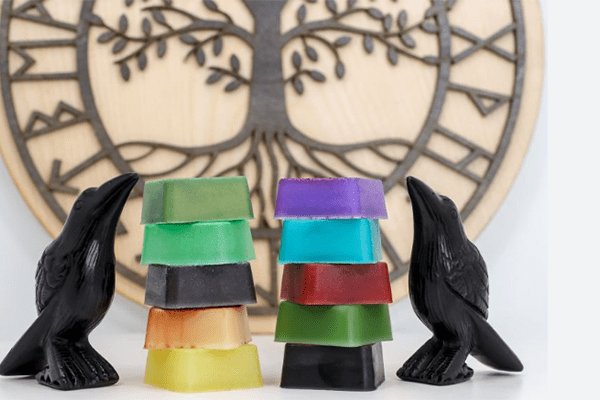|
RCBJ-Audible (Listen For Free)
|
Debra Glaze’s Birds of Valhalla Built An Artisanal Soap-Making Business On Good Ingredients And Good Yarns On TikTok
By Tina Traster
This is a story about a soap maker who has used a modern-day “soap story” genre to market her home-made artisanal products globally. We’re calling it a soap story because part of Debra Glaze’s success boils down to the art of storytelling: Glaze is a prolific TikTok and social media user who chronicles her process, and in the process, has garnered worldwide followers who’ve turned into loyal customers.
Glaze’s Birds of Valhalla, a New City home-based business, has thrived because its soaper is at heart an artist but also because she is a savvy businesswoman who’s turned what many do as a hobby into a profitable and growing enterprise.
Today soap is a $22 billion industry worldwide and 13 billion bars are sold in the U.S. annually. Most of that is mass-marketed; however, there’s a burgeoning market for handmade soap for sale at farmers’ and craft markets across the country. There are more than 300,000 soap-making businesses in the United States with the artisan and homemade soap-market generating $150 million per year.
Still, while many treat soap making as an avocation or side hustle, Glaze has built a full-time operation that generated more than $500,000 in annual revenue in 2023 and is expected to grow between 15 and 20 percent this year.

Glaze didn’t set out to be a soaper. The 45-year-old, who had a hard-scrabble background, is an incredibly gifted artist who spent a portion of her career as a chef at the Omega Institute in Rhinebeck. In 2018, a compromised immune system, along with caring for an autistic son, confined Glaze to a more home-based life. Her half-sister suggested soap making, which Glaze now likes to say is a cross between cooking and art. The experiment began in her Manhattan apartment on a small outdoor porch. The first batch lacked color or fragrance, but Glaze felt a stirring. She continued to perfect the art.
“It felt like I was making sculptures,” she said. “I didn’t see a way to make a career of it but it was like cooking, with oils and coconut, and like art, because I was using molds. And it made me happy. I felt immediate gratification. The colors were satisfying; the scents fill the house.”
And it turned out that people, mostly friends and family at first, wanted to buy the hand-cut bars.
Another unintended benefit of this new-found hobby was Glaze’s long-time acne cleared up after she began using her own soaps.
“At first, I didn’t know what I was doing but I put them on Facebook and people bought the bars for $4.
Glaze, a multi-media artist, had sold a plethora of creations for more than a dozen years on Etsy but she found herself at a crossroads; she was ready to cross over from hobbyist to businessperson but knew she’d have to develop a new set of skills.
“I had to learn business,” said Glaze. “And most importantly, I had to learn the art of marketing.”
Glaze, who taught herself how to make short-content videos, said her business blew up on TikTok.
“That’s what started it,” she said. “It led to hiring, growing the business, and relocating to New City,” in 2021 during COVID. From the double ranch on a steep hill, Glaze and her family moved into the upper level, and turned the lower level into Birds of Valhalla headquarters.
Glaze credits the more than 8,000 videos she has made for TikTok for putting her on the map.
“On TikTok, people see me,” she said. “They see me every single day. We make soap together. I ask them what kind of soap they want me to make. No one else does that. I have a relationship with the audience.”
The soaper says she did not take the traditional approach; she didn’t peddle her wares at farmers’ markets or look for retail outlets to carry her product. She created a community of virtual customers or as she says “supporters” and the business grew like a hot lather. Glaze likes to use the word “authentic,” when describing her product, finishing with the quip, the only “lye” in our soap is “lye,” — riffing on the idea that there’s only truth in her creations.
The history of soap stretches back to the ancient Babylonians in 2800 BC. Early soaps —common to the communal baths used by the Greeks and Romans—were likely brown or gray and soft and had no fragrances. Early bathers were accustomed to rubbing their bodies with clay or pumice and scraping the mixture off with a stigell, a curved, trowel-like instrument. Making soap was considered an artform in Italy, Spain, and France, when a purer, softer, and milder form of castile soap was formulated. In the Middle East, more sophisticated soaps were made using olive oil and exported to Europe. These small batches were reserved for the wealthy.
Soap’s benefits to fight infection and promote healing took root in the 19th and 20th centuries. American folklore is built around rural families mixing animal fat and lye created from ashes to produce their own soaps. That self-reliance has influenced soap-making hobbyists and boutique businesses – just like other artisanal forays including cheese making, distilleries, jams, bread making, and other crafts that have emerged as new cottage industries.
Glaze, perhaps more than many, had a understanding of what self-reliance looked like. She was born in Spring Valley to a young mother who struggled with mental illness. Her father abandoned both she and her brother; they both ended up in foster care for many years before being adopted by separate families. Glaze said she never really felt nurtured.
“I ended up raising myself.”
Fittingly she chose an industry whose essence is all about self-care. Birds of Valhalla manufactures and sells bars, hand soap, breastmilk soap, shampoo, coconut free soap. She has expanded her business to sell a host of sourced items: car fresheners, wax melts, candles, and cosmetics, as well as giftwrap paper, sweatshirts, mugs, cards, and stickers. She’s eyeing lip balms next.
Glaze, who started her business with $1,000 and some Facebook loyalists, employs nine people. Her best seller is the $45 variety pack.
Until now, Birds of Valhalla, which was streaming five nights a week on TikTok, would pull in between $500 and $2,000 per live video. But Glaze is facing one of the greatest challenges of her career because TikTok has changed its algorithms, and it’s become much more difficult, if not impossible, to rely on the platform.
“I’m worried about losing income,” said Glaze, adding TikTok-related sales represented the bulk of her income. Add to that, her husband lost his tech job recently, making her the sole breadwinner for the past year.
“Whenever I’m set with a challenge, I find another way,” said Glaze. “We’ll push more on YouTube and Facebook. We’ll market more to men. If TikTok is going to push out small creators, we’ll find a way. We’ll use social media. We’ll run traditional ads. We’re working on getting into the Amazon and Walmart stores.”
Glaze notes that many small soap makers fail because it’s difficult to find investors, but she continues to believe in her soap story, and of course, her ability to tell a story.
“I’ve always set myself apart by telling the story,” said Glaze. “I personally came from nothing, but I believe in living one’s passion, in being broken and rising up, in being a leader.”
By turning herself into a living avatar, Glaze has tapped into people’s innate sense of hope. She believes a good authentic product with a good story cooks up a soap opera with winning ratings, every time.
















